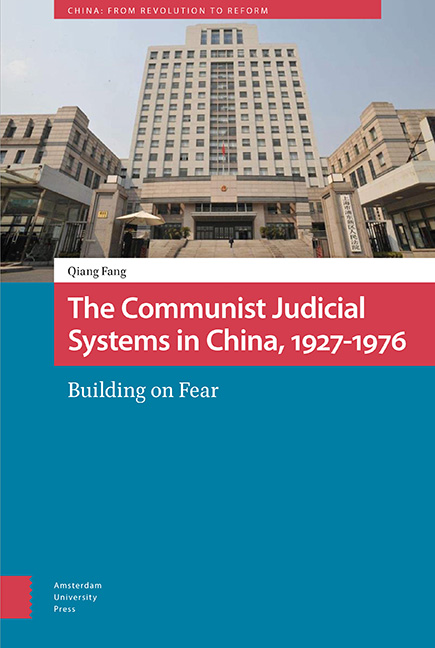Book contents
- Frontmatter
- Contents
- List of Tables
- Dedication
- Acknowledgement
- Acronyms
- Introduction: Building on Fear
- 1 Born in Blood: Origin of the Communist Judicial System in China, 1927–1935
- 2 Cornerstone or Aberration?: The Communist Judicial System during Wars with Japan and the GMD, 1936–1949
- 3 From “Excessive Lenience” to Harshness: The Communist Judicial System in the Early PRC, 1949-1952
- 4 A Deliberate Purge: Legal Reform in the Early PRC, 1952-1953
- 5 A Golden Age?: The Communist Judicial System in China, 1953-May 1957
- 6 The Great Leap of Law: The Communist Judicial System in China, 1957-1965
- 7 Not the Worst Period of Law: The Communist Judicial System in the Cultural Revolution, 1966-1976
- Conclusion: From Party’s Fear to People’s Fear
- Bibliography
- Index
Introduction: Building on Fear
Published online by Cambridge University Press: 18 June 2021
- Frontmatter
- Contents
- List of Tables
- Dedication
- Acknowledgement
- Acronyms
- Introduction: Building on Fear
- 1 Born in Blood: Origin of the Communist Judicial System in China, 1927–1935
- 2 Cornerstone or Aberration?: The Communist Judicial System during Wars with Japan and the GMD, 1936–1949
- 3 From “Excessive Lenience” to Harshness: The Communist Judicial System in the Early PRC, 1949-1952
- 4 A Deliberate Purge: Legal Reform in the Early PRC, 1952-1953
- 5 A Golden Age?: The Communist Judicial System in China, 1953-May 1957
- 6 The Great Leap of Law: The Communist Judicial System in China, 1957-1965
- 7 Not the Worst Period of Law: The Communist Judicial System in the Cultural Revolution, 1966-1976
- Conclusion: From Party’s Fear to People’s Fear
- Bibliography
- Index
Summary
Abstract
The book starts with recent cases in which several prominent Chinese dissidents have been punished under the crime of threatening state security. The Introduction then examines the long history of governmental imposition of draconian penalties on people for fear that they may threaten the rulers or ruling parties. The Communist judicial system in China is a hodgepodge that is a mixture of Soviet laws, Republican laws, and traditional Chinese legal norms. Throughout the Mao era, Communist judges had been swung from “left (law was a tool of the Party)” to “right (upholding basic legal principles).” During political campaigns, judges were required to stick to central policies to punish so-called political enemies severely. When the campaign subsided, many judges including top judicial officials began stressing legal principles.
Keywords: building on fear, legal hodgepodge, judicial pendulum
Building on Fear
In December 2017, the Second Tianjin Intermediate Court sentenced Wu Gan, whose internet nickname was “Super Vulgar Butcher,” to eight years in prison. The verdict accused Wu of “seriously threatening state security and social stability,” a crime synonymous with “counterrevolutionary” in the era of Mao Zedong (c. 1927-1976). Among his main “crimes” were providing legal support to victims of local government abuses, expressing anti-government rhetoric on the internet, “[O]rganizing boisterous protests outside courthouses and government offices,” and conducting illegal demonstrations. Among many Westerners, Wu Gan is not as famous as other Chinese political dissidents such as Liu Xiaobo, the 2010 Nobel Peace Prize winner, and Fang Lizhi, a leading figure in the 1986 student demonstrations. Since 2008, the Chinese Communist Party (CCP) has beefed up crackdowns against outspoken political critics and Wu Gan was just one of the many minor targets. Liu Xiaobo was sentenced to eleven years of imprisonment in 2009 for his championing of a “democratic charter.” In 2014, a Beijing court convicted Xu Zhiyong, a civil rights lawyer, for “gathering a crowd to disturb public order” and sentenced him to four years in prison. In June 2016, two dissidents in Zhejiang who had tried to promote a political party and “published prodemocracy essays on overseas websites” were harshly punished with eleven years in prison.
The People's Republic's campaigns against political dissenters and critics are by no means limited to the provinces of the mainland. The Party's long arm has extended to territories considered to be part of China or even to other countries.
- Type
- Chapter
- Information
- The Communist Judicial System in China, 1927–1976Building on Fear, pp. 13 - 36Publisher: Amsterdam University PressPrint publication year: 2021



